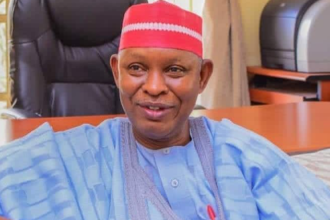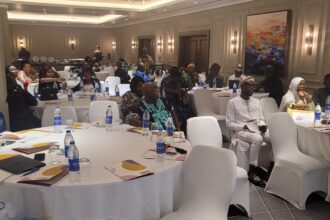IN climes where there are reasonable people in government, security of citizens always gets priority attention. This is why in countries like the United States, the United Kingdom, France and many others, the killing or death of a citizen in any of these countries, especially in careless circumstances, is always regarded as a big loss and taken seriously.
But in Nigeria, the reverse is the case. The attitude of those in government to avoidable death of citizenry usually exposes the shallow-mindedness of those elected or appointed to serve the citizens. It has become a part of a growing sickening national culture to outsource the consequence of human recklessness to the spiritual, to deliberately look the other way when clearly bestial behaviour of some people result in scores of death.
To properly educate the political class in the country (many of them are illiterates claiming to be educated), there is the need to give them a summary of the essence of state (societisation) and political authority\legitimacy, as espoused by great thinker and author of social contract, Thomas Hobbes, the famous English political philosopher who is largely credited with the founding of political science as an academic discipline.
In his famous treatise entitled Leviathan, Hobbes describes a place where life is “solitary, poor, nasty, brutish, and short” as being in a ‘state of nature.’ A further characteristic of such situation is that when people lock their doors and gates at night so as not to give an open invitation to prowling marauders, they also have to lock their hearts and minds because securing their doors is not enough. In such a state, there are no laws or covenant but principles of self-preservation and survival of the fittest.
Hobbes reasons that such chaotic and hellish living is not sustainable since only those who are able to protect themselves against external aggression will survive. Others will be exterminated. He consequently comes up with an explication on the transition from the ‘state of nature’ to a state where it will be profitable for everyone to live peacefully together as a body of organised people (community or civil society as we now call it), where individuals give up their rights for the collective. Such collective right is invested in another body of people call government or a sovereign with absolute authority in the sense that there is no other higher authority. The sovereign is expected to in turn ensure people live in an organised state. It is not only rights that the citizens invest in their government. They also invest hope in expectation that their political leaders will take the best decision on their behalf.
Regrettably, the ‘state of nature,’ a deplorable human condition long forsaken in human civilisation, has gradually been returning to some parts of the country since the advent of the government of President Muhammadu Buhari, courtesy of the murderous activities of Fulani herdsmen. The herders have snuffed lives out of many Nigerians in frequent clashes with their host communities in many parts of the country. The development has prompted some states like Ekiti and Benue to outlaw night grazing and restrict the activities. A national grazing bill seeking to take people’s land and give same to the herders and surreptitiously taken to the National Assembly sparked a heated national debate.
Perhaps the most audacious attack against armless Nigerians was the one recently launched against mainly Christian communities in southern Kaduna by suspected Fulani herdsmen. The onslaught came no thanks to the 24-hour curfew imposed in two of the affected local government councils and later relaxed. To the vicar-general of Kafanchan Catholic Archdiocese, Ibrahim Yakubu, the tragic onslaught was a pogrom. Those killed in the attack, according to him, were no fewer than 808, adding that 1,422 houses, 16 churches, 19 shops, a primary school were also destroyed, just as 57 were injured in the barbarism of the savages. He accused the federal and state government of failure to tackle the clampdown
“The herdsmen and their ilk turned the towns into killing fields and killed mostly women, children and the elderly who couldn’t run for cover. The level of barbarity was such that pregnant women got their wombs blown out and massacred before their children. And these innocent children were not spared either.
“This level of viciousness was never witnessed even in the brutal tyranny and regime of Adolf Hitler. What is most intriguing is the level of sophistication of weapons: Ak 47, machine guns and many other deadly instruments of death were freely used.
“The viciousness of these self-styled Jihadists sends shivers into the spines of our traumatised people. In the Godogodo and Pasakori attacks for example, the military merely watched and supervised the burning of our homes. When the youth mobilised to repel the attackers, the soldiers deliberately blocked them from entering the town,” the cleric said.
The church has rejected the N100 million largesse donated by the state governor, Nasir el-Rufai, for the rebuilding of the razed churches, in the usual Nigerian style of throwing money at problems rather than solving same. The Catholic Church prefers that the money be deployed as palliative for those rendered homeless in the wake of the unprovoked attacks.
Governor el-Rufai confirmed the repeated-ness of the attacks: “While the government and security agencies were working assiduously to block all windows to ensure that citizens throughout the three local government areas and the state at large are protected, these forces of darkness that represent evil and inhumanity struck again, killed innocent citizens, burnt their houses, injured some and terrified many.”
The governor’s reaction as the chief security officer of the state has exposed the sloppiness in the security architecture in the state, especially with the mass murder coming against the background of the Shiites-soldiers’ clashes leading to scores of deaths.
But what came as a rude shock to the sensibilities of the families of the casualties, and victims, as well as the memories of the casualties was the statement by the Inspector General of Police (IGP), Ibrahim Idris, disputing the 808 casualty figure given by the church. Curiously and ludicrously too, the IGP did not give the police figure of the casualty as would have been done in serious countries.
IGP’s counter-argument against the one advanced by the Catholic church should not in the main be about figure of casualties because it would make no sense to the police chief, as can be inferred from his rebuttal, if the figure had been say 20 or less. But does it mean the IGP needs to be told what the sanctity of human life means? Simply put, it means every life of every Nigerian counts.
That police could not guarantee the safety of the people of the area against an attack that started in October and stretched till December is a further indication of the failure of the policing architecture in the country. The tragedy also reinforces the calls for the restructuring of the country in a way that its institutions, including the police, will work properly and for the interest of the common people.
Granted, a mobile police base has been pledged to the people of the area by Idris. The fact that soldiers have taken over the trouble spots speaks volumes of the need to re-think policing and security generally in the country. Since the advent of the Fourth Republic, soldiers have increasingly been deployed in civil matters, from election to ethno-religious conflicts, and the growing militarisation should be a source of concern for the authorities.
It is unfortunate that the IGP has not shown the kind of interest he demonstrated in the Rivers rerun election in the massacre in southern Kaduna. If he was not with details of the casualty figure at the time he misfired, he could have mandated those directly in charge in the state to furnish him with preliminary reports. By now, an inquiry ought to have been launched to get the remote and immediate causes of the crisis.
It is hoped that the situation in southern Kaduna and other flashpoints in other parts of the country will be permanently contained because the consequence of not doing this is unpleasant. Security is the primary responsibility of government and as a scholar on Hobbes notes, “The failure of the government to protect the citizens is seen by Hobbes as the collapse of the sovereign….which encourages resort to self-help and chaos.” May Nigeria not get to that point!








